[ad_1]
Walk into Caribbean restaurant Canje in East Austin, and you instantly notice the potted plants dangling from the high ceiling like tropical earrings; the palm fronds and banana leaves painted on the walls; the woven chairs and low-back bar stools; and a bumping soundtrack emitting tunes from musicians like Bermudian reggae artist Collie Buddz.
But once the food comes, the flavors monopolize your attention. The scotch bonnet burn of jerk chicken, the depth of winter spices in a tingly wild boar pepperpot, the vibrant green sauce that enlivens giant prawns the size of small plantains.
These are the flavors chef-partner Tavel Bristol-Joseph grew up near, if not exactly with. The Georgetown, Guyana, native, who opened Canje last fall with his partners in the Emmer & Rye Hospitality Group, rarely had the opportunity in his youth to dive into fragrant curry chicken or his country’s staple pepperpot.
Canje represents a triumphant return to a home that was short on celebration — the chance for the chef to reclaim a phantom part of his past as he continues to build a career as one of the best chefs in the country.
A time of hopelessness
Bristol-Joseph spent most of his childhood in extreme poverty, his diet largely consisting of foraged coconuts and plantains and vegetable chunks distributed by the government. His family could afford to buy chicken or ground beef about once a month; the rest of the time, they made do with what was cheap and readily available.
So when Bristol-Joseph, whose 6-foot-5-inch frame occupies his kitchen’s doorway the way his warm conviviality fills the dining room, thinks back to the food of his childhood that served as Canje’s inspiration, it is the food he could smell but not taste. His story doesn’t include the rhapsodic tales of gardening with his grandmother or fishing with his father that populate some chef’s biographies.
“My journey is a little different than most. Because of the steps I’ve taken to be here, food was never this amazing thing,” said Bristol-Joseph. “You get one meal a day, and you better eat it all. I ate a lot because I was always hungry, but I was not in love with food.”
More Austin food news:Texas French Bread will be baking for the public again, future of damaged building unclear
That might mean picking mangoes as your sole meal of the day or mixing sugar in with your allotted rice portion at night, he said. Lunch at school included government biscuits and powdered milk, and more than a few fights. Bristol-Joseph didn’t beat people up for sport; he was hungry and desperate.
Asked if the scar on his face came from one of those tussles at school, Bristol-Joseph told a story of violence that his grandmother unleashed on him, which sent him to the hospital around the time of his 10th birthday.
Bristol-Joseph’s mother, Deborah Bristol, left Guyana when he was 9 months old, hopping off a connecting flight in New York City on the way back to Guyana from Canada. She sought a new life and always intended to bring her son to the United States once she could organize the papers. She wound up facing a lengthy bureaucratic struggle to retrieve her child.
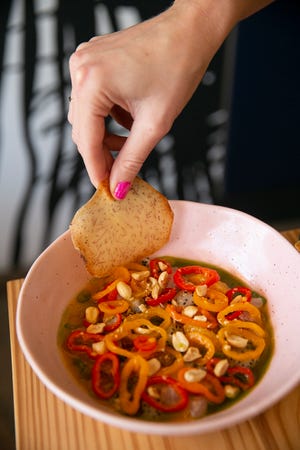
That left Bristol-Joseph to be raised by his father, Godfrey Joseph, until Tavel was 7. His father had briefly gone to the U.S. to earn money to secure passage for him and his son to leave Guyana. Days before he was to return to Guyana, Godfrey Joseph was shot and killed by his girlfriend. Bristol-Joseph spent his childhood under the false impression, one he said his family perpetuated, that the killer was his mother, whom he would not meet until he was a teenager and from whom he would finally learn the truth.
His early childhood was spent living with his dad, his paternal grandparents and five other relatives in a two-bedroom house without plumbing. Clean water was a 2-mile walk from home. The women of the family shared a room, and the men would sleep in the living room and kitchen, pulling the furniture from the house each night and using old clothes as bedding.
“You’d wake up with a Levi button mark on your face,” said Bristol-Joseph.
He would hide what little food he had from family and save a bowl of rice each night for his dad, who would come home from work and shoo vermin away from his nightly meal before eating and catching up with his son.
Hope held little space in Bristol-Joseph’s heart.
“No hope. I didn’t even think I was going to come to America. I thought I was going to stay there for the rest of my life,” Bristol-Joseph said. “It’s a hopelessness that makes you just want to survive.”
After his father died, Bristol-Joseph endured several years living under his grandparents’ harsh control before bouncing around between family and friends, whom he said treated him like “the help.” Outside of basketball at school, Bristol-Joseph had little refuge. No person, book or idea lent solace. He felt utterly alone.
A half-hearted entry into a home economics class in high school with his best friend offered the faintest first light of Bristol-Joseph’s future. Though at the time, the decision was not so much a clue to his career as it was a chance to be one of only two guys in a class populated by girls.
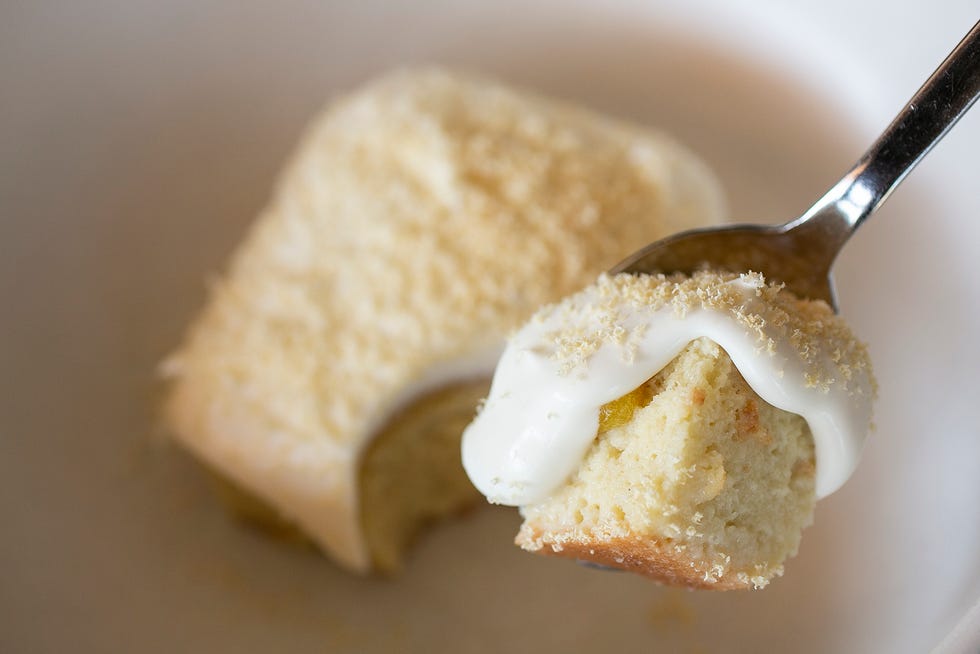
The course introduced Bristol-Joseph to baking, an exercise he continued with his aunt Lynette, whose home offered the teenager safety and a chance to imagine a different life. Lynette would punish the young man for staying out late playing basketball by having him help her bake.
Bristol-Joseph didn’t harbor notions of food on a romantic level. His interest was more elemental. That sugar he’d add to his rice as a child was his one furtive joy, his one sense of indulgence and escape. It would also serve as the granular basis for his career as an award-winning pastry chef.
The teenager and his aunt baked pound cakes, cookies and Jamaican pine tarts. Bristol-Joseph found in the middle-class home not only a surprising new hobby, but also his first modicum of hope.
“It actually helped me to be a better person,” Bristol-Joseph said.
Deborah Bristol returned to Guyana when her son was 15 and explained her absence and ongoing struggle to get the embassy to grant him papers to join her in the U.S. After years of navigating red tape, clerical minutiae and missteps, she secured a visa for her son. Two days after his high school graduation, mother and son boarded a plane to New York City and a new life Bristol-Joseph had never dared to imagine.
The best new restaurants in Austin:Find Matthew Odam’s picks for exciting new dining
New life in New York
If you think you’ve got what it takes to make it as a professional basketball player, you might want to first hit the courts on the streets of Brooklyn. That’s what Deborah Bristol told her teenage son when he arrived in New York with visions of following in the footsteps of New York Knicks players like Latrell Sprewell and John Starks. The kid from Guyana soon realized that his game didn’t stack up with the best in the city.
Taste of humble pie swallowed, Bristol-Joseph entered the New York Restaurant School. He intended to use it to land a job but not find a career. Bristol-Joseph was still finding his legs in New York, learning how to escape the trauma of his youth and enjoy a bounty of possibilities.
“Learning the city. Learning how to love. Learning that it’s not just me. And I’m going through my emotions of becoming a man,” Bristol-Joseph said about those years.
He added, “I wasn’t even focused on what I wanted to be in life. I was focused on what I am now, and this is a new environment. It was like starting my life over. I was focused on learning and growing as a person.”
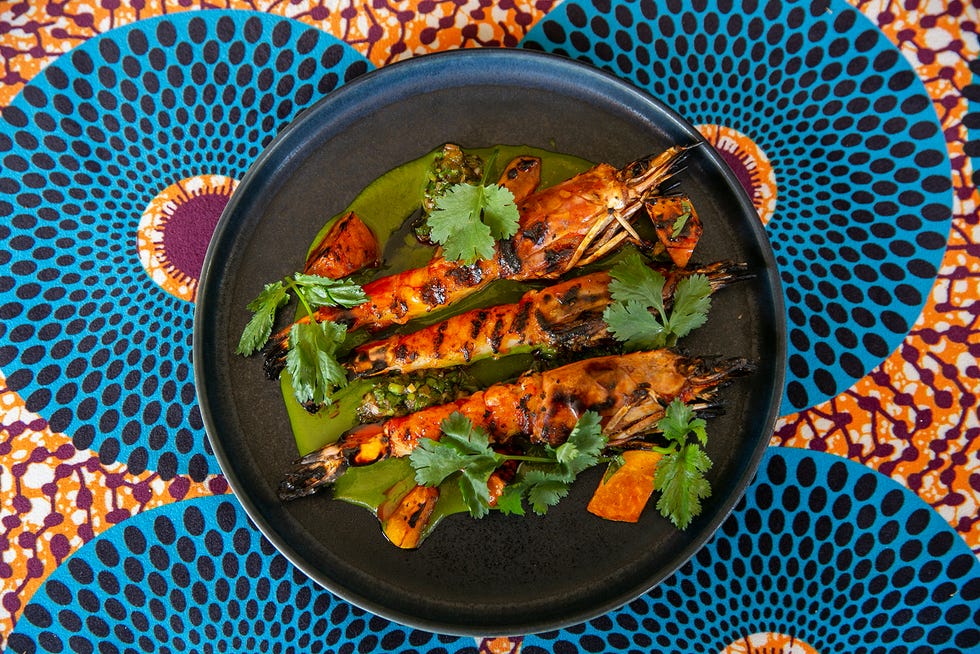
The time in New York allowed Bristol-Joseph not only to form his first serious bond with his mother, but to connect with the flavors that floated around him, just out of grasp, back home.
Deborah Bristol worked as a caterer and cooked for gatherings of family and friends in Brooklyn.
“When Debbie cooks, everybody shows up,” her son said.
Bristol-Joseph would help his mother in the kitchen. In watching her take ideas and techniques from TV shows and magazines and apply them to the vernacular of Caribbean cuisine, Bristol-Joseph first understood the evolution of cooking. It was an understanding the would later serve as the foundation for his own restaurant.
The young cook’s career evolved abruptly and unexpectedly. A stage (unpaid internship) in the pastry program at the famed River Cafe — “I knew I was connected to sugar,” he said — morphed into his first kitchen job.
Bristol-Joseph was hungry for growth that River Cafe would not offer him, so he left and staged at some of the city’s top restaurants — David Burke & Donatella, Eleven Madison Park — before taking a pastry sous chef job at Blue Fin at W New York in Times Square.
At the age of 23, Bristol-Joseph had a chef gig at a well-regarded restaurant. He was making $75,000 a year, earning benefits and navigating a life that looked nothing like the one he left in Guyana. But in addition to abundance, that new reality posed challenges for the chef who had always felt alone in Guyana.
“It felt like a whole new life. To be able to go to the grocery store and buy whatever I want, that was exciting. To be able to buy the cut of steak you wanted was a big deal,” Bristol-Joseph said. “And I also knew that I was different, and I wanted to fit in, because I came poor.”
The next step in his career would take place far from the big city. It would also be motivated by the reason he first took up cooking.
“I’m a sucker for love,” Bristol-Joseph said with a laugh.
More Austin food news:New Ranch 616 owners and old friends of Kevin Williamson on what’s changed, what remains
Head west
After seven years in New York, Bristol-Joseph followed a girl to Arizona, where her parents were opening a Jamaican restaurant. But that wouldn’t represent the chef’s first professional brush with Caribbean cooking.
While working for the Phoenix-based Fox Restaurant Concepts (Flower Child, Culinary Dropout), a friend introduced Bristol-Joseph to chef Kevin Fink, whose father, Rick, owned several restaurants in the Tucson area. Bristol-Joseph and the Finks formed a close working relationship over the next five years, with Bristol-Joseph working as a corporate chef for the restaurant group.
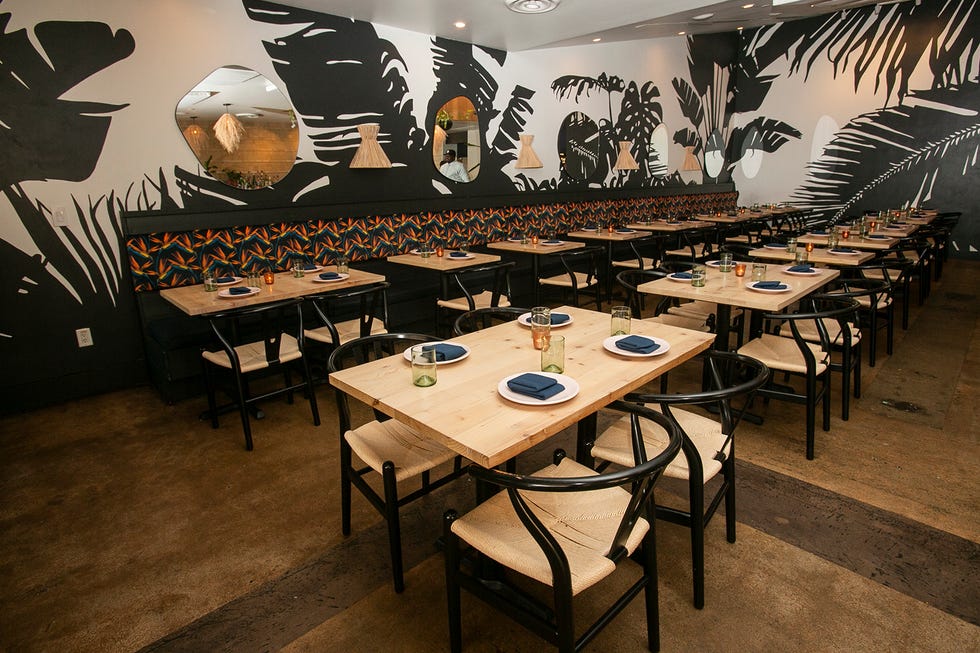
“His energy, flavors and thoughtfulness were at a different level than what we had seen before,” Kevin Fink told the American-Statesman. “We immediately knew his energy was special.”
Bristol-Joseph and Fink decamped for Austin in 2015. When the chefs landed in Texas, Bristol-Joseph searched for comfort, community and a grounding taste of home. Finding himself reflected in Caribbean cuisine gave Bristol-Joseph a portal into new locations in the past.
“My favorite foods — do they have it? Because if they don’t got it, then you don’t feel like you’re a part of it,” Bristol-Joseph said.
That was a problem in Austin. Bristol-Joseph’s search for Caribbean dining options led to one Jamaican food truck (Tony’s, which now has a sister restaurant in Pflugerville), but nothing beyond that. The fruitless search planted a seed in Bristol-Joseph that would germinate over several years.
Meanwhile, his culinary team embarked on a six-year stretch that would see the partners open four concepts — the heritage grain and fermentation-focused Emmer & Rye, fine dining live fire restaurant Hestia, tapas bar Kalimotxo and casual Henbit inside Fareground — and partner in a fifth, Israeli street food operation TLV. Fink and Bristol-Joseph earned Food & Wine magazine’s best new chef honors, and Emmer & Rye landed the No. 1 spot in the Austin360 Dining Guide.
During that time, the Caribbean idea gestated. The relative downtime of the pandemic gave the partners (including TLV founding chef Berty Richter, Alicynn Fink and Rand Egbert) time to breathe, focus and finally plan Canje, a restaurant that holds deep personal meaning for Bristol-Joseph.
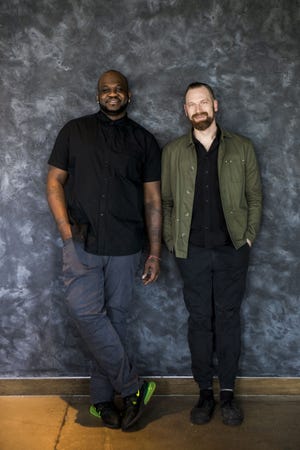
“Over the years that I’ve been cooking, if you look at the work that I do, it represents my journey. But I was never given the opportunity to eat the food that I eat or cook at home all the time. I always wanted to share that,” said Bristol-Joseph, who named Canje after the national bird of Guyana.
Canje doesn’t take the same didactic approach to service and explication of culinary philosophy as its siblings Emmer & Rye and Hestia. Bristol-Joseph wants the education to come through experience. By immersing diners in the flavors and sensations of his curries, roti and pepperpot, “this beautiful blend” of cultures and culinary traditions that is Guyanese food becomes evident.
“Tavel thinks about food and flavor through emotion and energy. He cares about the story — the how, the why — more than most people,” Fink said.
“Certain dishes get me excited, and it gives me spark,” Bristol-Joseph said.
Canje ignites that spark and spreads it throughout the restaurant, from the music to the cocktails to the kind of food that makes you want to share in fellowship.
“It’s an environment that gives you the energy and the vibe to realize that we are all here together in the same space,” Bristol-Joseph said. “Because that’s what Guyana is — it’s a cook-up of all of these different cultures.”
The Austin dining scene’s lack of diversity troubled the chef and inspired him to make change. Canje has not only had a hand in expanding Austin’s culinary offerings — there are also now several other Caribbean food trucks in town and a couple of restaurants— but it has become a place where diversity can be found in the kitchen. Canje’s chef de cuisine, Harvard Aninye, is a Black man, and sous chef Stefanie Torres is a Puerto Rican woman. The dining room on most nights is populated with a more diverse crowd than any upmarket restaurant in Austin.
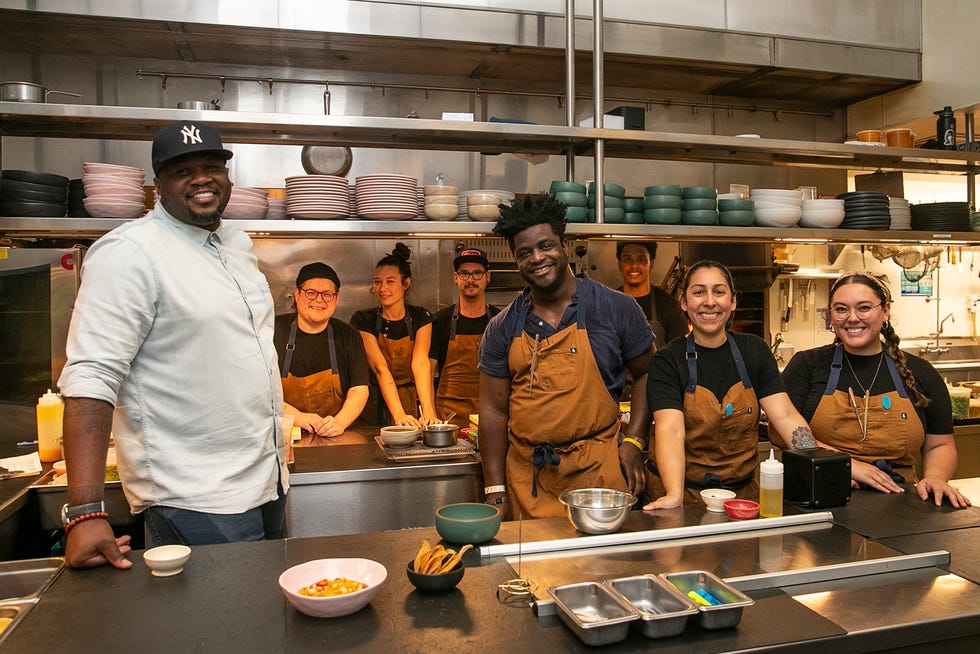
“The thing that surprised me more than anything else was how people would ask to speak to me and were expressing how important this restaurant is to the Austin community, and how much they have been waiting for the right representation and doing it at the quality and level at which we’ve been able to pull it off,” Bristol-Joseph said.
He continued, “It’s made a lot of people so proud and happy that we’re here. And not only the African American community, but there are people of Asian descent and (people who are) white who say they are so happy this is here. In all of our restaurants, I’ve never had that emotional connection.”
Bristol-Joseph said he faced disbelieving looks and even laughs from white guests in the early years at Emmer & Rye and Hestia when he would introduce himself as one of the restaurant’s owners. He always dismissed the disrespect. He’s endured worse.
That has not been part of the story at Canje.
The happy faces, positive feedback and diners’ sense of connection to his native culture and one another give Bristol-Joseph pride when he moves through the dining room. But that pride has been a throughline his entire career, before he achieved a modicum of fame, before people believed the restaurant he patrolled belonged to him.
“You’re talking about somebody who came from nothing,” Bristol-Joseph said. “So, if I have 10 cents, to me that’s a million. … I still have that same energy.”
Twenty-five years after leaving Guyana, the chef has tapped back into home and admits to feeling grounded in a way he never knew he needed.
“To see the transformation of an idea from a hope to a reality, it’s everything that I wanted it to be but more than I thought it was going to be,” Bristol-Joseph said. “It’s that little bit of culture you can hold onto that fuels the soul.”
If you go
Canje is located at 1914 E. Sixth St. The restaurant is open from 5 to 10 p.m. Sunday-Thursday and 5 to 11 p.m. Friday and Saturday. Find more information and make reservations at canjeatx.com.
Coming soon
Find Matthew Odam’s review of Canje — his first full restaurant review since the pandemic began — later this week at austin360.com.
[ad_2]
Source link




